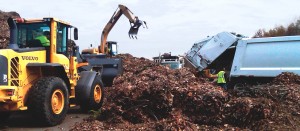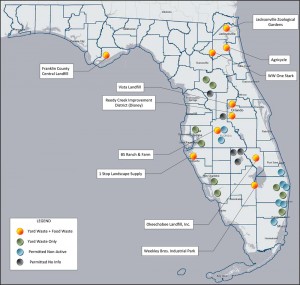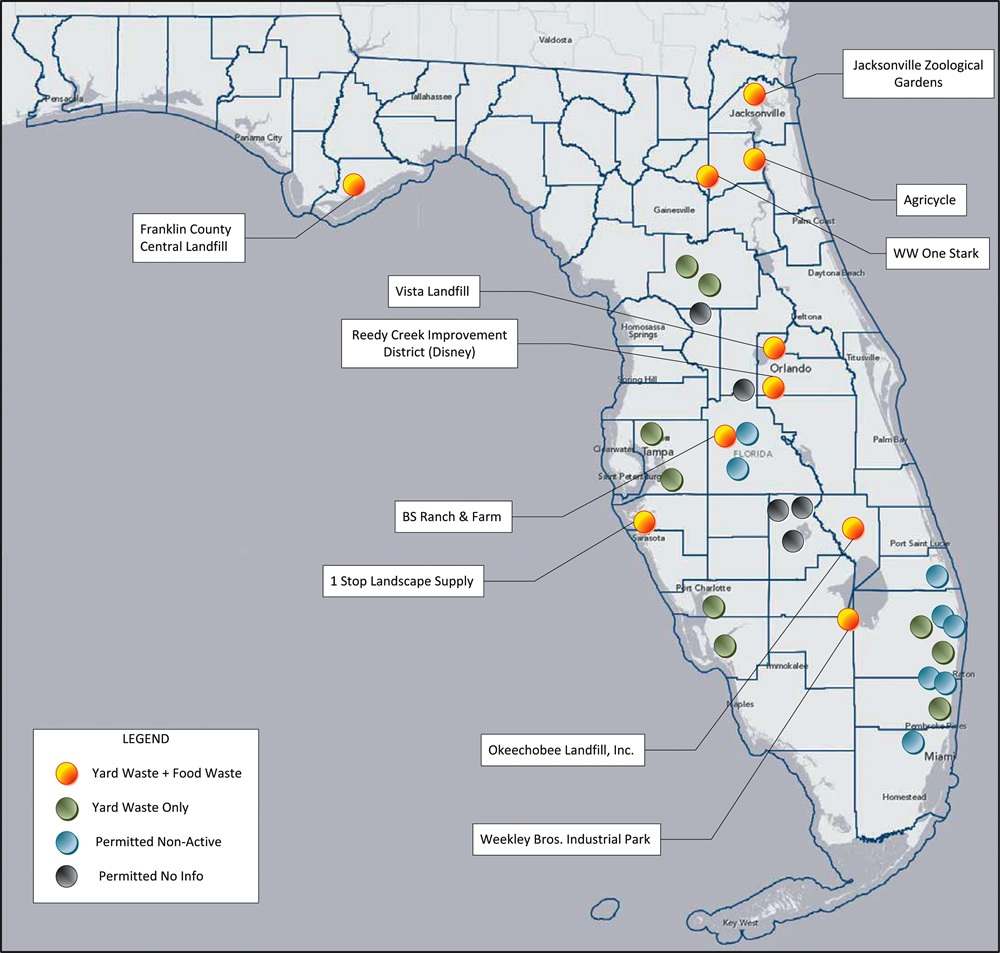Developments in North Carolina, South Carolina and Florida are captured in this roundup of commercial food waste diversion to composting.
Miriam Zimms and David Ver Eecke
BioCycle October 2012, Vol. 53, No. 10, p. 20
 Communities all over the Southeast are exploring program options to reach recycling goals set as high as 75 percent in some states. Many now have organics recycling — including food waste collection and composting — on their radar to increase existing recycling rates, especially once the capture of “low-hanging fruit” such as newspaper, plastic and aluminum, etc. is maximized. Based on extensive experience performing waste composition studies in the Southeast, Kessler Consulting, Inc. (KCI) has seen food waste range from 15 to 20 percent of a community’s total waste stream. Additionally, commercial waste streams have often been seen as high as 15 to 22 percent organic material.
Communities all over the Southeast are exploring program options to reach recycling goals set as high as 75 percent in some states. Many now have organics recycling — including food waste collection and composting — on their radar to increase existing recycling rates, especially once the capture of “low-hanging fruit” such as newspaper, plastic and aluminum, etc. is maximized. Based on extensive experience performing waste composition studies in the Southeast, Kessler Consulting, Inc. (KCI) has seen food waste range from 15 to 20 percent of a community’s total waste stream. Additionally, commercial waste streams have often been seen as high as 15 to 22 percent organic material.
As trends such as diminishing newspaper readership and reduced packaging continue, the proportion of food waste in the waste stream is expected to rise. Therefore, food waste recovery will be an increasingly critical focus for communities trying to achieve higher recycling goals. Including nonrecyclable paper as a part of the organics component also shifts another slice of the garbage pie from disposal to recovery. Projects featured in this article are focusing primarily on commercial food waste. Activity in three Southeast states is included in this roundup.
Mecklenburg County, North Carolina
In North Carolina, Mecklenburg County is taking a close look at food waste to raise its diversion rate. Data from a food waste diversion study conducted by KCI (completed in March 2012) is being used by Mecklenburg County to evaluate the feasibility of a food waste recovery pilot program and subsequent countywide roll-out aimed to help meet its goal of 35 percent waste reduction by 2018. The study found that the commercial sector in the county generates 143,000 tons of food waste annually. The top 300 businesses in the largest food waste generating sectors — food manufacturing, retail food, retail restaurants, hotels/lodging, medical/health and education — generate 49,300 tons/year, or 35 percent of the total tonnage.
Composting operations in the region already handle over 36,000 tons/year of food waste and have an estimated 30,400 tons/year of unused capacity. Currently, Mecklenburg is reaching out to the community to build interest and awareness for food waste diversion. The county is also assessing the infrastructure to collect and process food waste within its borders or the region. It identified three existing facilities and four proposed facilities within a 100-mile radius of the center of Mecklenburg County. Haulers use that 100-mile radius as a gauge for collecting from businesses and corporate distribution centers and delivering to a processing facility. Of the haulers surveyed, 50 percent responded with an interest in providing food waste collection and mobilizing within 90 days. Thirty percent stated they had experience with food waste collection.
Mecklenburg County Environmental Manager Laurette Hall notes the county is working with local businesses and the North Carolina Division of Environmental Health to conduct a commercial food waste pilot within the next year. It also is considering a residential food waste pilot. The food waste diversion study estimated that Mecklenburg County’s residential sector generates approximately 38,900 to 60,100 tons/year of food waste of which an estimated 2 to 5 percent (800 to 2,900 tons/year) is being recovered through home composting. A comprehensive residential food waste recovery program could capture another estimated 13,900 to 27,800 tons/year, notes the report.
Charleston County, South Carolina
A great example of the trend toward organics recovery can be seen in Charleston County, South Carolina. The county’s Bees Ferry Composting Facility is the only site in the state permitted to process food waste and yard trimmings. It produces over 60,000 tons/year of finished compost. Charleston County established a pilot commercial food waste composting program in 2011. The pilot targeted large commercial food waste generators and composted a total of 2,000 tons of food waste. Upon the conclusion of the pilot, the county was given approval to take the program full-scale in June 2012, which will help it reach its 40 percent recycling goal for 2012.
The full-scale rollout targets all food waste generators in Charleston County, small or large. Currently, 58 businesses are participating in the program. To help with its expansion, the county provides local businesses with waste assessments and educates them on what can be recycled and who to call for collection services. Both pre and postconsumer food waste is accepted, including food prep and plate scrapings. Yard trimmings are shredded with a Doppstadt unit, mixed with the food waste, and the material is put in windrows, which are turned with a Scarab. The tip fee for food waste at the composting facility is $25/ton. The commercial sector represents 59 percent of the total waste stream. With both a recycling program (all fiber and all containers) and an organics program (yard waste, food waste and nonrecyclable paper) for compostable material, 82 percent of the material is recoverable from the commercial sector.
Also in 2011, a county-wide ban was enacted on plastic bags containing yard trimmings delivered by public and private collection haulers to the composting site. This was a challenging but essential step as residents had to change the way they disposed of yard trimmings. The disposal ban has been successful in creating higher quality compost that could be marketed to residents and commercial customers. Since the announcement of the 2011 ban, the facility has observed a 95 percent reduction in plastic bags received. Charleston County Recycling Program Manager Carolyn Carusos attributes the success to the “support of the local community and local officials” adding that, “education and outreach programs are critical and have been essential to maintaining the quality of Charleston County’s compost.” Both bulk and bagged compost are sold; in 2011, sales were approximately $54,000.
State Of Florida
The State of Florida has a 75 percent recycling goal, which is helping to drive increased composting. Even though the goal is an unfunded mandate, local governments are revising plans and adding food waste composting to their comprehensive program mix and targeting the commercial sector in this state.
Another factor leading to increased food waste diversion is expanded corporate sustainability programs. Many companies have asked their haulers to provide food waste collection as a way to expand their sustainability initiatives. For example, Publix Super Markets, a large, regional grocery chain, has partnered with Waste Management (WM) to develop a composting facility in Okeechobee, Florida that will accept up to 30,000 tons/year of preconsumer food waste, including produce, bakery and floral items from over 40 Publix stores.
Finally, growth of composting facilities in Florida, especially private ones, can be partly attributed to a change in the state’s regulations regarding permits for composting facilities in 2010. The Florida Organics Recycling Center for Excellence (www.floridaforce. org) was instrumental in performing research and working with the organics industry in Florida for the changes allowing composting facilities processing source separated food waste to operate under a registration rather than a solid waste permit, greatly reducing costs and barriers for companies wishing to build a facility. Revised regulations also allow for the combination of food waste and yard trimmings to be composted. The Florida Department of Environmental Protection (FDEP) database reports that 11 facilities (out of a total of 24 full-scale facilities) are permitted or registered to accept food waste for composting.
 Large hauling companies like Waste Management (WM) have entered the composting industry to create an avenue for not only their existing corporate customers and big box stores, but also other commercial food waste generators. In 2011, WM opened up two facilities in Florida, one in Okeechobee serving southwest Florida and one in Apopka serving central Florida. Both facilities are utilizing the AC Composter covered composting technologies supplied by Engineered Compost Systems (ECS). The 8-acre, $2 million Okeechobee composting facility opened in November 2011, and is permitted to process 30,000 tons/year (15,000 tons of yard trimmings and 15,000 tons of preconsumer food waste). It has almost reached capacity after 10 months of operation. The Okeechobee facility is the first fully-dedicated organics composting facility in South Florida accepting yard trimmings and preconsumer food waste. The site is configured to accommodate 11 adjacent aerated static piles. Currently, finished compost is being sold to area farmers in bulk for agricultural application.
Large hauling companies like Waste Management (WM) have entered the composting industry to create an avenue for not only their existing corporate customers and big box stores, but also other commercial food waste generators. In 2011, WM opened up two facilities in Florida, one in Okeechobee serving southwest Florida and one in Apopka serving central Florida. Both facilities are utilizing the AC Composter covered composting technologies supplied by Engineered Compost Systems (ECS). The 8-acre, $2 million Okeechobee composting facility opened in November 2011, and is permitted to process 30,000 tons/year (15,000 tons of yard trimmings and 15,000 tons of preconsumer food waste). It has almost reached capacity after 10 months of operation. The Okeechobee facility is the first fully-dedicated organics composting facility in South Florida accepting yard trimmings and preconsumer food waste. The site is configured to accommodate 11 adjacent aerated static piles. Currently, finished compost is being sold to area farmers in bulk for agricultural application.
The 150-acre, $4 million Apopka “Vista” composting facility is permitted to process 45,000 tons/year of material. Currently, the facility is operating at around half-capacity, or roughly 22,000 tons/year. The Vista facility is the first fully-dedicated organics composting facility in Central Florida. Incoming feedstocks include yard trimmings from Orange County as well as pre and postconsumer food waste (including meat and dairy proteins). The Vista facility utilizes the same covered ASP system in use at the Okeechobee facility, in addition to nine ECS in-floor aeration bunkers. Currently, finished compost is only being used on the adjacent landfill as cover.
Miriam Zimms and David Ver Eecke are with Kessler Consulting, Inc. based in Tampa, FL. She serves as Director of Program Planning and Development for the company and has worked on developing organics recycling programs across the Southeast. David serves as a lively and dedicated research analyst for the company. They can be reached at 813-971-8333 or visit www.kesconsult.com or www.floridaforce.org for more information.










